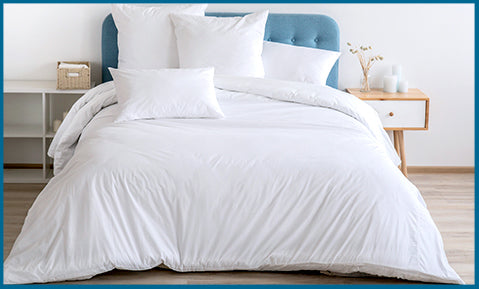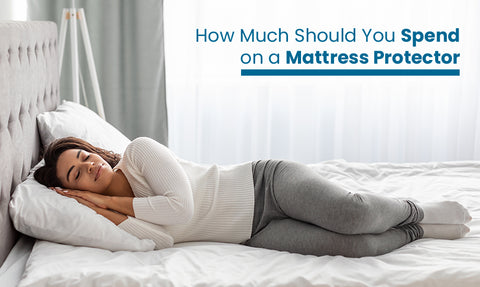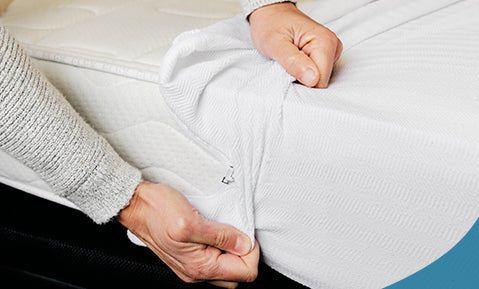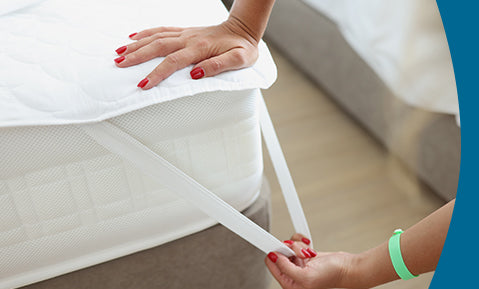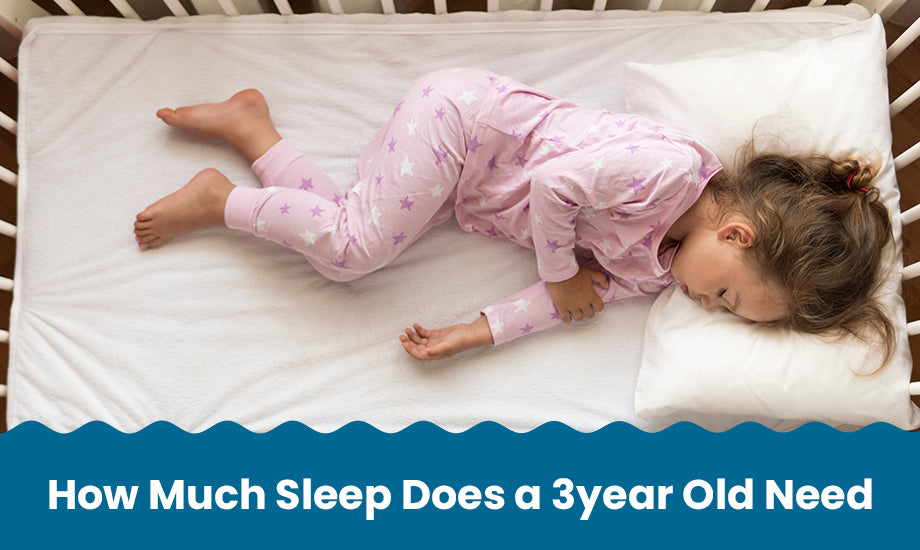
Today we are living in a fast-paced world where instead of fixing our sleep schedules, we take power naps. While an adult ideally needs 7 to 8 hours of sleep at night, the need of hours of sleep varies for teenagers and kids. Learning problems, weight management problems, growth issues are a few concerns that arise due to lack of sleep in toddlers.
If you are concerned about the amount of sleep your kid is getting and want to know how much exactly your 3-year-old needs, then find the guide from this article.
How Much Does Healthy Sleep Impact your Kid?
Sleep is essential for learning, growth, and development, among other things. Unfortunately, research has revealed that the majority of youngsters are not getting enough. On an average a 3year old gets 9.68 hours of sleep a day.
According to the American Academy of Sleep Medicine, most three-year-old require 10 to 13 hours of sleep per day (including naps).
Keep in mind that 2-year-olds require up to 14 hours of sleep, so if your child just turned three, their needs may be greater. Toddlers and preschoolers require a lot of sleep, but how can you know how much they're getting? You've probably seen what occurs when a preschooler doesn't get enough sleep if you've ever met three years old.
Age and individual needs are taken into account when determining the recommended amount of sleep. It can significantly affect your child's behavior—and your sanity—to be able to discern whether they are well-rested.
Why Children Require More Sleep than An Adult?
Children require more sleep than adults since they are still undergoing considerable physical and mental growth. Sleep is a vital aspect of physical and cognitive well-being, and the extra shuteye helps children grow into healthy adults.
Furthermore, children who get enough sleep perform better academically and socially. Better intellectual abilities, higher moods, and more physical energy are all associated with getting enough sleep.
Children produce a growth hormone during sleep that is vital to their development. The secretion of this important hormone can, however, be impacted by sleep deprivation.
Kids' needs for sleep change with age. The amount of sleep necessary is highest for infants, and as children get older, the amount of sleep needed steadily decreases.
For instance, while children in school-age need to sleep for 9 to 12 hours per day, babies require 12 to 16 hours of sleep. Additionally, throughout childhood and adolescence, a child's sleep habits shift. Toddlers and young children take one nap per day, whereas infants take the most naps. School-aged youngsters eventually stop taking midday naps because their sleep requirements decrease.
By establishing a regular sleep pattern for their children from early childhood through adolescence, parents can play a crucial role in ensuring that they get enough rest. A good mattress and a cozy sleeping environment can also aid in better sleep.
How Does Age Affect Kids' Sleep Needs?
As kids become older, their sleep demands alter. These requirements are determined by how much physical or mental growth they experience at each stage. As they become older, they require progressively less sleep.
The early years are when a child's brain grows the fastest and most fully. Therefore, in order for their brains to develop properly, newborns and young children require more sleep. They do, however, undergo more of a shift from important cerebral development to physical growth as they continue to grow.
The pituitary gland secretes a hormone known as growth hormone during childhood (HGH). This hormone aids in bringing about physical modifications to the height, bones, and muscles.
Age-related increases in HGH levels reach their apex during puberty. Sleep is crucial for the growth hormone's release, according to research. Therefore, insufficient sleep could reduce the level of growth hormone in children and adolescents, reducing their ability to expand physically.
Sleep is therefore essential for children's growth even though older children may require less hours of sleep than younger children.
How to Understand If your child Isn't getting enough sleep?
The signs that your child isn't getting enough sleep include them waking up frequently, complaining of being tired during the day, the fact that they are older yet still nap, the fact that they sleep more on the weekends, have difficulty focusing, and poorer academic performance.
More information about how to tell if your child isn't getting enough sleep is provided in the list below.
- You have to continuously tell them to wake up: You have to wake your children up numerous times before they finally get out of bed, it may be an indication that they still need more sleep.
- They claim to be exhausted during the day: The fact that your child would express their need of sleep to you directly is a clearer symptom.
- They take afternoon naps: While taking afternoon naps is common for babies and young children, most kids stop taking them once they start school. Therefore, there is a significant probability that your school-age child or teen isn't getting enough sleep if they require an afternoon nap.
- On the weekends, they sleep more: Kids who don't get enough sleep may try to make up for it over the weekend.
- They have difficulties in focusing: If you notice your youngster has trouble concentrating, sleep deprivation may be the cause. Kids who don't get enough sleep have trouble focusing, just like adults do.
- They're performing worse in school: Your child's academic performance may deteriorate as a result of poor concentration due to lack of sleep. Consider speaking with their teacher and modifying their sleep routine if you see a decline in their academic performance.
What Helps Kids Get Better Sleep?
Setting a sleep schedule, creating a bedtime routine, turning off screens before bed, avoiding caffeinated or sugary drinks, and exercising every day are all methods to help kids sleep better.
More information about these suggestions for improved sleep is given in the list that follows.
- Establish a Sleeping Plan: One of the best strategies to guarantee that your child sleeps better is to establish a sleep schedule. The schedule will depend on the child's age, how much sleep they require, and their wake-up time, among other things.
- Set up a Bedtime Routine: A bedtime routine can make your youngster feel more at ease and prepared for sleep. Good bedtime habits in children means washing their teeth, taking a bath, and reading a book. Reading a book before bed might also assist someone who is having nightmares by getting their thoughts to concentrate on happier sights and ideas.
- Avoiding Too Much Caffeine and Sugar: In general, doctors advise against giving children too much caffeine or sugar. But when it comes to getting a better night's sleep, this is especially true. Their energy levels may soar if they have a sugary beverage just before bed, which will make it more difficult for them to relax and drift off.
- Invest in Good Pillows: To ensure your little on gets adequate sleep, it is important you provide them with comfortable bedding and pillows. To get the best baby pillows for sleeping, you can check out online stores like Sleepsia.
- Restrict Usage of Electronic Goods: Access to electronic screens for children should be restricted at least an hour before their planned sleep. Examples include mobile phones and tabs. This is due to the fact that these gadgets prevent the melatonin hormone, which aids in sleep promotion, from being produced. As a result, people won't feel as sleepy but rather more awake.
- Exercise During the Day: Exercise not only benefits children's health, but it also helps them sleep better. Children who are more active than those who aren't tend to fall asleep more quickly and have better-quality sleep overall.
Where Should a 3-year-Old Sleep? Crib or in a Bed
The American Academy of Pediatrics (AAP) advises putting your child in a bed when they are 35 inches (89 cm) tall, or when the side rail height is roughly at nipple level on the lowest setting.
Transferring a toddler to a twin bed from a crib is a huge change that might momentarily result in them having some sleep conflicts. It may be simpler to make the adjustment if you prepare your child for it by reading books about this change, or letting them choose new bedding and bed pillows, and practicing during the day.
Conclusion
Just as crucial to your child's health as exercise and a balanced diet is making sure they receive enough sleep. Most kids at this age require 10 to 13 hours of sleep each day, including a 1-to-2-hour afternoon nap. Remember that every child is different, and that includes the way they sleep.
Two of the most obvious signs of a well-rested preschooler are their mood and behavior. Aim for a regular daily schedule that includes lots of opportunity for exercise and fresh air. Additionally, keep in mind that a relaxing pre-bed habit and an early bedtime will help to create the ideal environment for rest and sanity.


